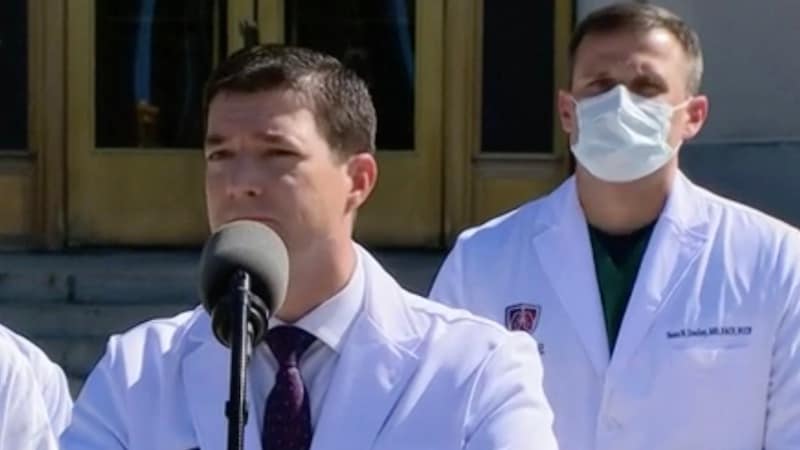Editor’s note: Find the latest COVID-19 news and guidance in Medscape’s Coronavirus Resource Center.
President Donald Trump is “up and active” and being closely monitored at Walter Reed National Military Medical Center, the White House physician said during a press conference this morning. He was hospitalized yesterday for treatment and observation after receiving a positive test early Friday for SARS-CoV-2.
“He has been fever-free for more than 24 hours” and is not receiving oxygen therapy, said Sean Conley, DO. Conley said he is “cautiously optimistic” about the president’s health status.
However, a source familiar with the president’s health told the White House press pool on background that “the President’s vitals over last 24 hours were very concerning and the next 48 hours will be critical in terms of his care. We are still not on a clear path to a full recovery.”
Conley also said that the president was 72 hours into his diagnosis, which contradicted earlier reports from the White House. The timeline raises the question of whether the president attended any in-person events this week while aware of his positive test status.
In a follow-up memo released after the press conference, Conley said, “This morning while summarizing the President’s health, I incorrectly used the term ‘seventy two hours’ instead of ‘day three’ and ‘forty eight hours’ instead of ‘day two’ with regards to his diagnosis and the administration of the polyclonal antibody.”
Flanked by members of the Trump’s care team, Conley noted that the president already started a recommended 5-day course of remdesivir therapy. When asked by a reporter why the president would receive remdesivir on top of the antibody cocktail treatment, Conley replied, “He is receiving the standard of care and beyond at the moment. We are maximizing all aspects of his care and taking a multipronged approach.”
The president has not experienced any difficulty breathing, Conley said. “He had a cough, a fever, and felt run down.”
He did not answer a follow-up question about whether the president had received steroids.
“He’s doing great,” Conley said. His oxygen saturation is 96%, his heart rate is in the 70s to 80s, and his blood pressure remains in the 110 to 120 mm Hg systolic range, where it has been historically, he said.
“He has plenty of work to get done from his chief of staff and he’s doing it,” Conley added.
Ultrasound scans show no concerns with his lungs, Conley noted, and “all indications are that he will remain off oxygen going forward.”
He said the president did not receive oxygen Friday or today, but when a reporter asked if he had ever been on oxygen at any point since his positive test result, Conley did not answer.
Questions Remain
Conley said Trump was tested after a close associate was confirmed to have a positive test on Thursday. Early Friday morning, PCR test results confirmed the president’s initial test result, he said.
Conley would not commit to a date when asked about the president’s likely discharge from Walter Reed. “I don’t want to put a date on that. Every day we will evaluate if he needs to be here.”
“We are monitoring him very closely,” said Sean N. Dooley, MD, who specializes in pulmonary critical care. The president’s cardiac, liver, and kidney functions are all normal, he said.
“We are encouraging him to eat, drink, and get out of bed,” Brian Garibaldi, MD, who also specializes in pulmonary critical care, said during the conference. “He is in exceptionally good spirits.” Gairbaldi added that during morning rounds on Saturday, he heard the president say, “I feel like I can walk out of here today.”
First Lady Melania Trump, who also tested positive for COVID-19, was not admitted to the hospital. “She is doing well, and had no indication for hospitalization,” Conley said.
A reporter asked Conley why the president was admitted to Walter Reed given his optimistic findings of the president’s health at the moment.
He responded, “Because he is the president.”
Damian McNamara is a staff journalist based in Miami. He covers a wide range of medical specialties, including infectious diseases, gastroenterology, and neurology. Follow Damian on Twitter: @MedReporter.
For more news, follow Medscape on Facebook, Twitter, Instagram, and YouTube.
